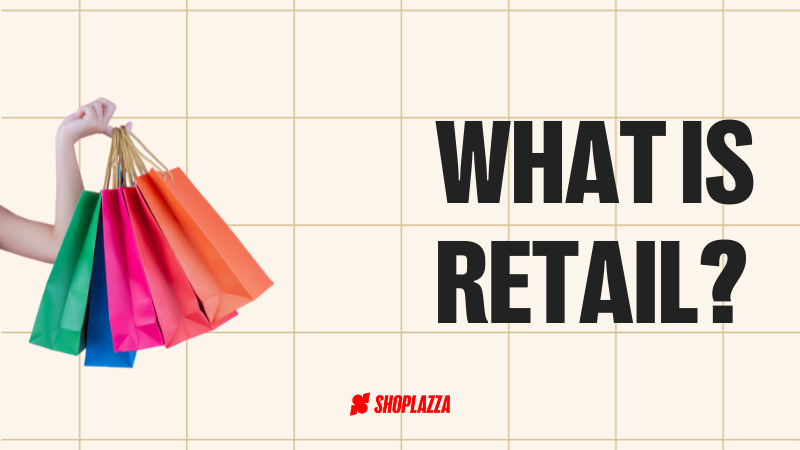
What is retail? If you have no clue, then this article is the best opportunity for you to learn about it. Retail can be considered the basis of the ecommerce world, serving as a bridge between manufacturers and consumers.
Encompassing a wide range of businesses including brick-and-mortar stores and online platforms, retail is where goods and services are sold directly to customers for their personal use.
If you’re running an e-business or is planning to open your own online store, understanding the dynamics of retail is vital to navigating the industry successfully. So with no further ado, let's explore what retail is and how your online venture fits into this world. Are you ready? 😉
Start your online retail business today with Shoplazza! 💳
What is a retail business?
The word retail means the sale of goods to the public, so automatically, a retail business is an entity that engages in the direct selling of products and services to consumers. These businesses serve as intermediaries, procuring products from manufacturers or wholesalers and making them available to end users.
Whether a small boutique or a large department store, the fundamental principle remains the same: catering to customer demands and fulfilling their needs. Retail establishments can be physical stores, online shops or a combination of both, offering customers various channels to make their purchases.
Types of retail businesses
The retail industry encompasses a diverse array of businesses and it's considered the largest private sector employer. Many retailers share the same characteristics and target audience. Here are some common types of retail businesses you can find in the market:
1. Department stores
These large retail stores offer a wide range of products, from clothing and electronics to household goods. They typically have multiple sections or departments, providing customers with a comprehensive shopping experience. Some of the well-known retailer examples in the sector are Walmart and Nordstrom.
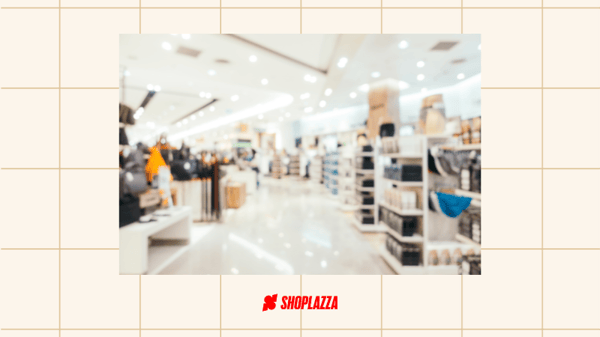
2. Discount stores
These retailers focus on providing products at lower prices than traditional retail outlets. They often offer a wide selection of merchandise, catering to cost-conscious consumers who seek affordable options.
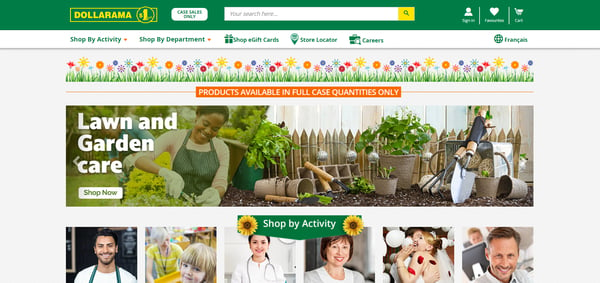
Dollarama is a discount store chain with over 1,500 stores across Canada. Because Dollarama buys their products in bulk, they can manage to have lower prices compared to other stores. Dollarama is an example of a retailer that is selling goods directly online and offline.
3. Specialty stores
These retail establishments focus on a specific product category or niche, such as clothing, electronics or home decor. They provide a specialized shopping experience and cater to customers with specific interests or preferences.
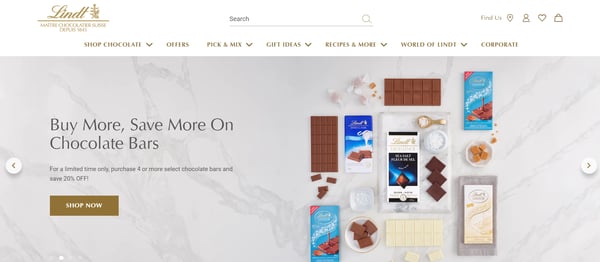
For example, if you want to buy great quality chocolate, you may have to look for chocolate stores close to you, such as Lindt, or search on the internet for their website to buy their delicious candy.
4. Online retailers
With the rise of ecommerce, online retailers have gained immense popularity. These businesses operate through digital platforms, allowing customers to make purchases from the comfort of their homes. They often offer a wide range of products and convenient shipping options.
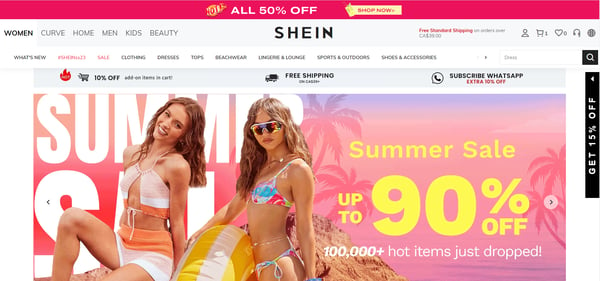
SHEIN is a great example of an online retailer since it's focused mainly on digital sales. It boosted its brand awareness during the pandemic, when online sales had a significant part in consumer behavior.
This kind of online retail store emerged, and with a lot of technology, a lot of entrepreneurs are starting their own online businesses, making sure they have independence with a small investment.
If you’re still looking for examples of retail stores, we prepared a small list of three of the most famous retail stores in the world, so you can have a clear vision of how retail businesses maintain their activities.
3 examples of famous retail stores
Victoria's Secret
Victoria's Secret is a globally recognized lingerie and beauty retailer that has become synonymous with glamour and sophistication.
With its signature fashion shows—you probably heard of Victoria’s Secret’s Angels—and strategic marketing campaigns, Victoria's Secret has established itself as a leader in the intimate apparel industry.
The brand's expansive network of retail stores, both in malls and standalone locations, offers a beautiful shopping experience for its customers. Through its distinctive brand image and emphasis on customer satisfaction, Victoria's Secret has achieved remarkable success among retail shops.
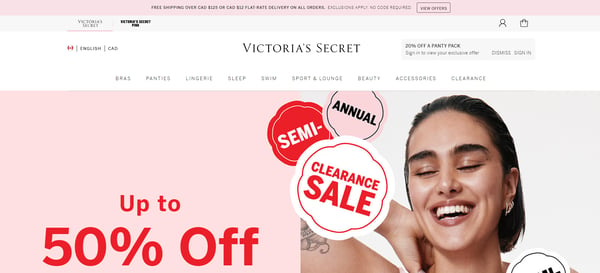
Because of the boom of the internet, Victoria’s Secret is one of the various department stores that saw the internet as a way to increase their retail business, and now you can buy all of their products online with only a few clicks.
Walmart
Walmart is an American multinational retail business that has grown to become the world's largest retailer by revenue.
Known for its "everyday low prices" business model, Walmart has revolutionized the retail industry by making affordable products accessible to a wide range of consumers. The company operates a vast network of discount stores, hypermarkets and supercenters across the globe, providing customers with an extensive selection of merchandise, including groceries, electronics, clothing and more.
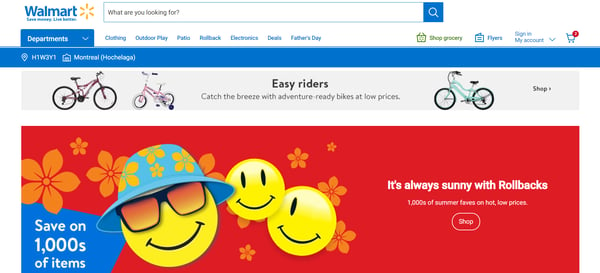
Walmart is another retailer that saw the digital landscape as an opportunity to create another business branch. On Walmart’s website, you can order groceries, schedule a pickup and buy different types of products from different suppliers.
Walmart's ability to leverage economies of scale, optimize its supply chain and deliver customer value has contributed to its retail sales, and you probably knew about them before this article, huh? 🤷
Apple
The technology giant retailer, Apple has not only transformed the electronics industry but also revolutionized the retail sector with its iconic Apple Stores!
These retail outlets serve as showcases of Apple’s innovative products, providing unique and immersive customer experience to its clients.
Apple stores are designed with meticulous attention to detail, featuring sleek and modern aesthetics, knowledgeable staff and hands-on product demonstrations, making sure customers have a complete experience while thinking of buying something at a store.
By creating a direct contact point with customers, mixing retail and technology, Apple has redefined the concept of a retail store, setting new standards for customer experience and brand loyalty—I know you know someone that can’t wait for Apple’s next release. 🍎
What is retail: conclusion

If you’re here, you probably got everything you need to know about what is retail. However, if you think you need more information, we can sure summarize it for you.
So, from the beginning, stores play a pivotal role in the retail business world, acting as the final link in the retail supply chain, connecting manufacturers and consumers. Whether you operate department stores or an ecommerce venture, understanding the dynamics of retail is crucial for your business idea to become a success!
Remember, the retail industry is continually evolving, driven by changing consumer demands and technological advancements. Stay tuned to new market trends, and logistics, embrace innovation, and adapt your business model to remain competitive in this dynamic landscape.
What is retail: FAQ
1. What is retail and how does it differ from wholesale?
Retail refers to the process of direct selling goods or services to consumers for their personal use. It involves the final step in the supply chain, where products are made available through various channels such as retail stores, online platforms or a combination of both. Wholesale, on the other hand, involves selling goods in large quantities to businesses or retailers rather than individual consumers.
2. What are some examples of retail stores?
Retail stores come in various forms, catering to different consumer needs. Examples include department stores, discount stores, specialty stores and large retail outlets like Walmart or Target. These stores offer a wide range of merchandise, from clothing and electronics to food and household goods, providing customers with options and convenience.
3. How does the retail supply chain work?
The retail supply chain encompasses the process of getting products from manufacturers to end consumers. It typically involves several stages, including sourcing raw materials, manufacturing, and distribution to the retail establishment. Retailers purchase goods from manufacturers or wholesalers, manage their inventory, and make them available for purchase by consumers through retail outlets or online platforms.
4. What is the importance of customer satisfaction in the retail industry?
Customer satisfaction is vital in the retail industry as it directly impacts customer loyalty and brand reputation. Retailers must understand and meet customer expectations by providing quality products, exceptional customer service, and a positive shopping experience. Customers satisfied with a company’s supply chain are more likely to become loyal advocates and drive word-of-mouth recommendations, contributing to the overall success of retail businesses.
5. How do retail businesses determine their prices and profit margins?
Retail businesses consider various factors when determining prices and profit margins. These factors include the cost of acquiring goods from manufacturers or wholesalers, operating expenses, competition, market demand, and desired profit goals. Retailers often strike a balance between offering competitive prices to attract customers while maintaining sustainable profit margins to sustain their business operations and growth.
Ready to become a retailer?



